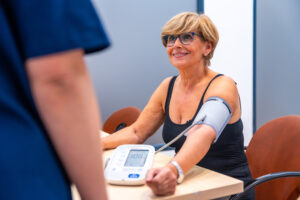How Stress Impacts Blood Pressure and Ways to Manage It
 Daily schedules rarely slow down. A buzzing phone, a stalled commute, or a tense meeting can each jolt the body into high alert for a moment. Stack enough of those moments together, and blood‑pressure readings begin to drift upward in ways that will not fade once traffic clears.
Daily schedules rarely slow down. A buzzing phone, a stalled commute, or a tense meeting can each jolt the body into high alert for a moment. Stack enough of those moments together, and blood‑pressure readings begin to drift upward in ways that will not fade once traffic clears.
Why Stress Raises Blood Pressure
Real or perceived threats trigger an instant chemical burst. Adrenaline and noradrenaline tighten vessels and accelerate the heart, often lifting systolic pressure by twenty points or more for several minutes. One surge fades quickly, yet dozens each day accumulate. A long‑term study published in Hypertension followed adults for seven years and found that those with higher baseline stress hormones nearly doubled their risk of developing sustained high blood pressure. Each repeated surge also stresses the delicate endothelial lining that regulates vessel tone, paving the way for early plaque buildup.
Chronic Strain and Hypertension Risk
Short bursts of tension are only half the story. Persistent strain keeps cortisol slightly above normal around the clock, enhancing adrenaline’s effect, encouraging salt retention, and nudging abdominal fat higher—all reliable routes to elevated resting numbers. About forty‑eight percent of American adults now live with hypertension, and psychological distress raises the odds of having high blood pressure by roughly fifty percent. Economic pressure and discrimination deepen the burden in many communities, leading to earlier onset and more severe complications.
Practical Ways to Turn the Tide
- Regular movement. Roughly 150 minutes of brisk walking, cycling, or swimming each week can trim four to nine systolic points while clearing stress hormones after every session.
- Deliberate breathing. Slow diaphragmatic breaths, such as the 4‑7‑8 rhythm (inhale four counts, hold seven, exhale eight), begin calming the nervous system within a few minutes and can lower systolic pressure by up to ten points.
- Reliable sleep. Seven to nine hours nightly reset hormonal cycles; dark, cool rooms and screen curfews help.
- DASH‑style meals. Produce, whole grains, and low‑fat dairy paired with less than 1,500 milligrams of sodium per day ease arterial tension and curb cortisol‑driven cravings.
- Support circles. Regular contact with friends, community groups, or hobby clubs buffers hassles and limits risky coping habits such as heavy drinking, smoking, or ultraprocessed snacking.
When Lifestyle Steps Need Reinforcement
Many patients reach target numbers with habits alone; others benefit from medication. Beta blockers, calcium‑channel blockers, diuretics, and related agents act on different points in the pressure pathway, yet each works best alongside exercise, nutrition, and restorative sleep. Dose choices, follow‑up, and adjustments belong in a clinician‑guided plan tailored to personal history.
Take the First Step Toward Better Health
Managing stress‑related hypertension is less about removing every pressure from life and more about building resilience through movement, nutrition, rest, and community. Dr. Kavita Rao’s internal‑medicine offices in St. Petersburg and Largo design personalized blood‑pressure management plans that blend safe lifestyle guidance with evidence‑based treatment.
Ready to take charge of blood pressure? Contact us today at 727‑525‑0900 to schedule an appointment and begin the journey toward a calmer heart and healthier life.

